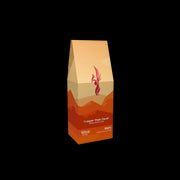The shelf life of coffee depends largely on its form—whole beans, ground coffee, or brewed coffee. Let’s break down how long each of these types lasts and how to keep them fresh for as long as possible.
1. Whole Coffee Beans
Whole coffee beans have the longest shelf life among coffee products. When stored properly, they can last:
- In a sealed bag (unopened): 6–9 months at room temperature. Some may last up to a year depending on the roast and packaging.
- In an airtight container (after opening): 1–3 months. If vacuum-sealed or stored in the freezer, you may extend their freshness to 6 months.
Beans lose their flavor over time as the oils inside break down, but they remain safe to consume for longer than they stay fresh. Even a year-old bag of beans won’t be harmful—it’ll just lack that vibrant flavor and aroma.
2. Ground Coffee
Once coffee is ground, its surface area increases dramatically, speeding up the oxidation process. Ground coffee generally lasts:
- Unopened: Up to 3–5 months past the best-by date when stored in a cool, dry place.
- Opened: 1–2 weeks for optimal freshness. Like beans, freezing grounds can help extend the life to around 1 month.
Because of how quickly ground coffee loses flavor, it’s best to grind beans as needed. If you do buy pre-ground coffee, be mindful of how quickly you’ll use it up.
3. Brewed Coffee
While it’s unlikely you’ll have a cup of brewed coffee lying around for weeks, understanding how long it lasts is still helpful.
- At room temperature: Brewed coffee typically lasts 12 hours before it starts tasting stale. After that, the oils begin to go rancid, leading to a bitter or sour flavor.
- In the fridge: If refrigerated in an airtight container, brewed coffee can last up to 3–4 days. Iced coffee and cold brew can sometimes taste fine for up to a week, but the flavor will gradually degrade over time.
How to Tell If Coffee Has Gone Bad
Now, coffee doesn’t exactly spoil like milk or meat, but it does lose its characteristic flavor and aroma. You can still drink old coffee, but it might taste dull or bitter. Here are some signs your coffee is past its prime:
-
Smell: Fresh coffee has a rich, robust aroma. If your coffee smells weak or stale, it’s a sign the oils have deteriorated.
-
Taste: Old coffee will often taste flat, lacking the vibrant notes you’re used to. If it’s bitter or overly sour, it's time for new beans.
-
Appearance: Whole beans and ground coffee may become visibly lighter as the oils oxidize. If you notice white spots or an oily sheen, it could be a sign the coffee is rancid.
Best Practices for Storing Coffee
To make the most of your coffee and maintain its freshness, follow these storage tips:
1. Keep It Airtight
Exposure to oxygen is coffee’s worst enemy. Once you open your bag of beans or grounds, transfer them to an airtight container to prevent oxidation. A vacuum-sealed container is ideal, but even a tightly sealed jar will help.
2. Store in a Cool, Dark Place
Light, heat, and moisture accelerate the aging process of coffee. A pantry or cupboard away from direct sunlight and heat sources (like stoves or ovens) is the best place to store coffee. Avoid keeping it on the counter, especially if it’s near a window.
3. Freezing Coffee: A Debate
The topic of freezing coffee is hotly debated among coffee enthusiasts. If you buy in bulk and won’t use the beans within a few months, freezing is a viable option. Store the coffee in an airtight, moisture-resistant container to avoid freezer burn.
However, once you thaw the beans, don't re-freeze them. Freezing and thawing repeatedly can cause condensation, which degrades flavor.
4. Grind Only What You Need
For the freshest cup, grind your coffee right before brewing. Once ground, coffee rapidly loses its flavor due to increased surface area. A burr grinder can give you the freshest, most consistent grind.
Can You Drink Expired Coffee?
Yes, you can drink coffee after its best-by date, but the taste may be less enjoyable. Coffee doesn’t go bad in a way that’s unsafe for consumption, like moldy bread or sour milk. Instead, it just becomes stale, flat, or bitter as time goes on. So, if you’re not too picky, that old bag of coffee in your pantry might still work—just don’t expect a premium experience. If you notice rancid or musty flavors, however, it’s best to toss it out and get a fresh batch.









